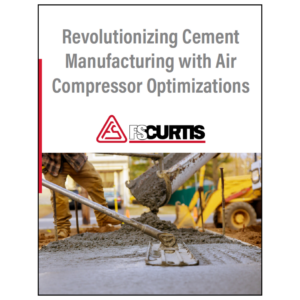Cement
 Air compressors assist in several steps of cement production to provide good quality materials efficiently.
Air compressors assist in several steps of cement production to provide good quality materials efficiently.
Air compressors help ensure reliable operations within the cement industry. Processes such as blending, delivering, loading, unloading, and transporting are accomplished quickly and effectively because of compressed air machinery.
Air compressors are used in many different avenues during cement-making production, as seen in a few examples below:
- Ash handling system: Compressed air powers the machinery responsible for collecting, storing, and loading out various types of ash residue. This ensures the ash can be managed and disposed of safely.
- Tool powering: Cement mixers and grinders are powered using compressed air. Without air compressors, the tools wouldn’t function as quickly or efficiently.
- Cleaning: Pneumatic systems help power the machines that remove water, dust, oil, and solid contaminants from compressed air.
- Conveying: Air compressor systems help transport cement powder from storage to production. This is important because cement powder clumps if not managed properly, so the material relies on pneumatic machinery to stay in motion.
The award-winning NxHE Series offers several benefits over a traditional single-stage air compressor. Power efficiency has been maximized with FS-Curtis’ exclusive profile air end, centrifugal fan, and generously sized components. The NxHE Series exclusively features eCool™ Technology, which protects critical components from compressor-generated heat, thereby extending component life and reducing downtime. This state-of-the-art technology also boasts the lowest life-cycle cost of any compressor on the market. Click here to learn more about how the NxHE Series can save you money or contact us.
Unlock Efficiency: Discover Cutting-Edge Air Compressor Innovations for Cement Manufacturing
Dive into cement production optimization with our latest white paper, “Revolutionizing Cement Manufacturing with Air Compressor Innovations.” Learn how to revolutionize your operations by maximizing uptime and efficiency with our essential maintenance tips tailored for compressed air systems in the cement industry. From mitigating downtime risks to curbing energy consumption, our expert insights empower you to elevate reliability, efficiency, and safety standards.
Don’t miss out on securing your competitive edge—download our white paper today. Download Now





